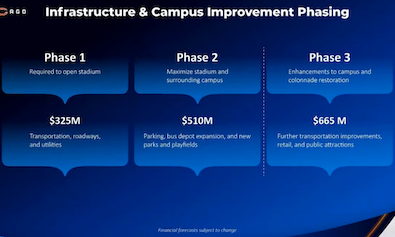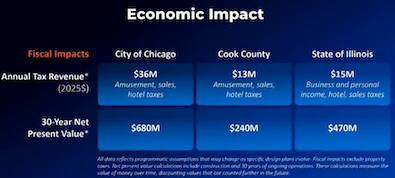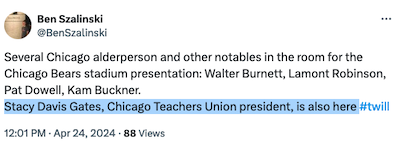* Gov. JB Pritzker was asked today about his thoughts on the Bears’ domed stadium proposal…
Well, let me start out by saying I’m a Bears fan.
But you know, before I became governor, I was a businessman, and I’ve tried to be a good steward of taxpayer dollars throughout my term in office. And as you know, I’ve been very active in attracting businesses to Illinois and helping companies in Illinois expand. So that’s something that I do with, again, the role of protector of the Illinois taxpayers dollars in mind at all times.
But I remain skeptical about this proposal. And I wonder whether it’s a good deal for the taxpayers. It’s early and I have not even heard the announcement today, but obviously read your reporting and others. But it’s very important to me that with all the state needs to accomplish, that, you know, we think about what the priorities are of the state. You know, here we stand talking about the Health Care Protection Act. Later today I’m going to be talking more about birth equity, and helping to build birth centers in areas of the state where people don’t have options for their for giving birth, that are outside of hospitals. And that requires capital. There are a lot of priorities the state has and I’m not sure that this is among the highest priorities for taxpayers.
Q: …I know you’ve also said you’re open to listening to proposals from sports teams. What would it take to put the Bears over the finish line with this? Given, you know, are there any lessons to be learned from the last 20-30 years and state governments familiarity with this topic?
Pritzker: Well, maybe one lesson that can be learned just from the last few years is stadium deals and taxpayers putting money forward for stadium deals, not particularly popular around the country.
Take note that the winner of the Super Bowls this year, the team went out to try to get a stadium financed by the public and it was rejected by the public in a place where the Super Bowl champions reside. And I think this is, you know, a recognition that these are private businesses, that the owners of these private businesses need to put a lot more forward in order to get, you know, have their dreams fulfilled and not just rely upon the taxpayers of Illinois to make that happen for them.
Having said that, I think all of us want success for the state. We want more commerce, we want more jobs, we want our teams to be successful. So you know we share all of that in common, but we’ve got to use our dollars wisely.
Please pardon any transcription errors.
You can watch the team’s press conference today on the Bears’ homepage.
…Adding… Bears President and CEO Kevin Warren was introduced as the man who shepherded Minnesota Vikings’ new stadium project. From a recent local newspaper story…
U.S. Bank Stadium, the home of the Minnesota Vikings, will require some $280 million in maintenance to remain in top condition over the next decade, including nearly $48 million next year, according to an architectural assessment released Friday.
…Adding… Mayor Johnson is going all-in with effusive praise, and claimed: “This project will result in no new taxes on the residents of Chicago.” Except, nobody has yet said how that new capital spending will be paid for.
…Adding… The mayor just said the new venue would host several events. What he doesn’t say is that the plan allows the Bears to keep the revenues from those events.
…Adding… Is it weird that they’re doing a splashy news media briefing before briefing the governor?
…Adding… This is the capital plan. The Bears claim they’ve worked “closely with the state” on funding sources, but the governor’s office says they haven’t talked to them about it…

That’s $1.5 billion in capital longterm.
Also note the fine print at the bottom. “Financial forecasts subject to change.”
…Adding… $15 million for the state ain’t much. Just sayin…

…Adding… Click here for the full press release. Renderings are here. Economic impact study is here.
…Adding… Gov. Pritzker just pointed out during another press conference that three professional sports teams are hoping to build new stadiums, but the Bears plan uses all the available bonding authority for this project, leaving nothing for the other two.
…Adding… Isabel just asked how the capital plan will be funded. “There are dollars that we believe exist at the state level, at the potentially federal level, [and] at the city level,” CEO Williams said. So, he didn’t answer the question.
Isabel asked a follow-up about specific funding from the state, but Williams would only say “We do look forward to having some detailed conversations with the state here in the near future.”
…Adding… Senate President Harmon react…
Senate President Don Harmon (D-Oak Park) issued the following statement regarding the Chicago Bears’ stadium proposal unveiled Wednesday:
“At first glance, more than $2 billion in private funding is better than zero and a more credible opening offer. But there’s an obvious, substantial gap remaining, and I echo the governor’s skepticism.”
…Adding… House Speaker Chris Welch…
The Speaker is happy to continue engaging in conversations regarding the future of our Chicago teams, and is encouraged by the private investments being proposed. In the current legislative environment, with many important budget pressures, there hasn’t been a strong appetite for these projects. Environments can and do often change in Springfield, but the Speaker’s priority is to stay focused on passing a balanced budget and continuing the positive outlook we saw announced by Moody’s yesterday.
Welch also told reporters today that if he put this plan on the big board today it would fail miserably.
…Adding… Asked if he thought the plan could run this spring or if they would wait until the veto session, Warren said…
I mean, we feel that the time is now. I mean, every year that we wait, it’s 150 to $200 million of increased costs. That ultimately will, we’ll have to figure out, but we don’t think that’s prudent The time is now. So our expectation is in this session. And the reason why we’re staging that now and not even in a fall veto session is because even if we’re approved in a veto session, we wouldn’t be able to get into the ground because of the weather, we would push it back a year. If we’re approved in May, then that will allow us to be able to start construction to put people to work next summer. and that would allow us 36 months later to open up our building in 2028. So this truly is one of those adages that time is money, and we do need to figure figure this out. And that’s why we’ve put forward such a robust program and plan.
…Adding… Mayor Johnson was asked: “You have a host of progressive priorities in the capital such as more education and migrant funding. How are you going to make a progressive case for a publicly funded sports stadium?” The response…
Well, because of the public benefit, you know. I mean, again, the best way to grow our economy really requires partnerships with public and private entities. That’s exactly what this does. We’re investing in people. You know, look, these these pictures are miraculous. We’re talking about thousands of lives that will benefit from this investment. You know, the fact that we have not just a storied history with this franchise, but with the McCaskey family, with Kevin Warren’s leadership with the entire Bears organization, my administration. We know that the sooner we can put shovels in the ground and put people to work, that is our surest way to secure a better stronger, safer Chicago and it benefits the entire region. We’re talking about $8 billion of economic vibrancy as a result of this investment. The time is now for that. Think about how long people have been waiting for investments like this.
…Adding… A top Pritzker administration official says the Bears “have no risk under this scenario. The risk is 100% on the state.”
…Adding… Asked about the White Sox plan, Warren admitted the Bears’ plan “doesn’t include any money for what they want. But it doesn’t mean that money does not exist for what they want. So that’s why we’re continuing conversations.” Um. OK. Magic money?
…Adding… Gov. Pritzker went from saying he remained skeptical this morning, to saying he is “highly skeptical of the proposal that’s been made” this afternoon. He continued: “I believe strongly that this is not a high priority for legislators and certainly not for me, when I compare it to all the other things when we’re talking about health care here, even when you talk about capital for health care as they’re asking for capital for a stadium.”
…Adding… Gov. Pritzker said he could eventually support a plan, but this plan “can be a lot better for taxpayers than what they put forward.”
…Adding… Speaker Welch told reporters today what he said he told the Bears privately last week: “If we were to put this issue on the board for a vote right now, it would fail and it would fail miserably. There’s no environment for something like this today. Now in Springfield environments change. Will that environment change within the next 30 days? I think that’s highly unlikely.”
…Adding… More from Welch today…
Again, environments do change in Springfield. I mean, people’s minds can be convinced, there’s gonna be a lot of conversations. But as the governor noted, there’s three teams in Chicago. You have the Bears, the White Sox and, and the Chicago Red Stars, the women’s soccer team. They’re all wanting a share of this pot. And I think you have to seriously have those conversations as well. You know, in sports, equity is very important. Equity is at the center of everything we do in the House and so I don’t think anyone can be left out of that conversation. And so I think what’s happening today is really the kickoff, no pun intended.
…Adding… Sen. Peters…
State Senator Robert Peters (D-Chicago) released the following statement in response to the Chicago Bears’ proposal for a new domed lakefront stadium:
“I haven’t had the opportunity to thoroughly examine every aspect of the proposal just yet. I do want to give the Chicago Bears credit on putting forth private dollars. However, I remain skeptical using public dollars to fund private sports teams.
“Illinoisans are facing many challenges, and my job first and foremost is to take on those challenges and improve the lives of everyday Illinoisans. I’ll always keep the door open for further conversations, especially as I look more into the details of this proposal.
“Chicago is a world-class city and we must do all we can to maintain a strong tourism and entertainment culture but I just want to make sure I do that responsibly.”
And Sen. Lewis…
Officials with the Chicago Bears unveiled a new stadium plan on Wednesday that has Illinois taxpayers on the hook for half of the cost of the multi-billion-dollar project. In response to the new stadium details and cost, State Senator Seth Lewis (R-Bartlett) issued the following statement:
“For the past several months, Illinoisans have heard stadium proposals from the White Sox and Chicago Bears, but what has been missing has been statements of accountability for taxpayers and the fans. As Minority Spokesperson for the Appropriations-Public Safety & Infrastructure Committee, the Sports Finance Authority will be coming before us with their Fiscal Year 2025 budget request. During this hearing, I will be very interested to hear if they are seriously considering this proposal, and if so, how they are planning to protect taxpayers and ensure a positive return on their investment. Additionally, and perhaps more importantly, I will be interested to learn if they have the ability to hold the team’s ownership accountable for producing results that will satisfy the team’s fanbase. These issues could include protecting seat license-holders, ticket prices, and perhaps even producing a playoff-contention team.”





















